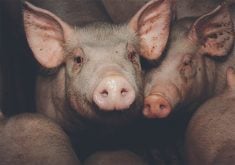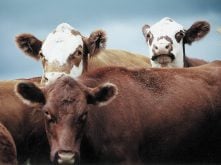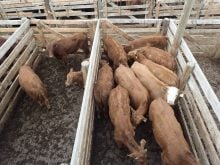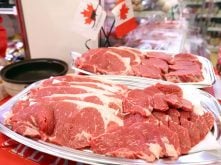It’s been three years since the last horse slaughter plant in the United States closed its doors.
However, an American horse organization is hoping that plants will soon open in that country, beginning in Wyoming.
Sue Wallis, executive director of United Organizations of the Horse, is planning to build a plant in Wyoming that will set a new standard for humane horse slaughter.
Plans are not formalized about where or when a plant would be built, but Wallis said there is political support in the state to make it happen.
Read Also

More factors affecting winter weather
When you combine a weak La Niña, early Siberian snow, and a warm northern Pacific, it’s easy to see why long-range winter forecasting is so complex.
“Wyoming is a good place (for the plant) because we are a conservative state, an agricultural state,” said Wallis, a representative in Wyoming’s state legislature.
“People here get it. They understand the realities of what it takes to make a living with animals.… The animal rights wackos really stick out and they don’t get much of a toe hold here.”
United Organizations of the Horse, which Wallis described as a loose coalition of state horse councils and groups working on wild horse issues, has asked renowned livestock expert Temple Grandin to help build a humane slaughter plant.
“She fully supports what we’re trying to do,” Wallis said.
“And she and her team at Fort Collins (Colorado State University) are going to design all of the live horse handling facilities of our plant, up through the kill box.”
The last horse slaughter plant in the U.S., located in Rockford, Illinois, was closed in 2007, but Wallis said the practice is not illegal.
She said it is possible to open a slaughter plant in almost every state, but a rider attached to a U.S. agricultural bill several years ago prohibits the USDA from inspecting horse meat.
“Without that USDA stamp, you can’t ship it across a state line,” Wallis said. “
Which means you can’t get the export market, which as we all know is the main market for horse meat.”
To get around that restriction, the Wyoming coalition plans to sell the horse meat to the pet food industry and to zoos, markets that aren’t bound by the same interstate rules on trade.
Wallis said the horse industry in Wyoming decided to build a slaughter house to deal with the need for regulated and humane horse slaughter in the U.S.
She said the end of the horse slaughter industry has resulted in more animal abandonments on roadsides or on federal land, while unwanted animals have overwhelmed horse rescue shelters.
United Organizations of the Horse was founded several years ago as a political lobby group to counter the influence of the Humane Society of the U.S. and other animal rights groups in Washington, D.C.
However, after 18 months of work in the political arena, the group shifted toward pragmatic action.
“It came to a point where we realized that we were kind of spinning our wheels,” Wallis said.
“If we were really going to change things for the horse industry, somebody was just going to have to do it (build a plant).”
If they were going to build a facility, she added, they wanted to set a new standard for horse slaughter plants.
“How can we put together an enterprise that will do what needs to be done, in a way that shows the world … this is how you do it right,” Wallis said.
Once the plant is open, Wallis hopes other states will follow.
However, a spokesperson for the Humane Society of the U.S. remains skeptical that United Organizations of the Horse will manage to pull it off.
Grandin’s name may carry weight in political and livestock circles, but Nancy Perry, vice-president of government affairs for the humane society, doesn’t believe the celebrated expert is directly connected to the Wyoming initiative.
She said Wallis and others are likely using Grandin’s name to add a veneer of humane slaughter practices to the project.
“We contacted her and she said she was hardly involved with this,” Perry said.
“I think she might have been contacted or consulted (by folks in Wyoming) but I don’t understand that she’s endorsing this or involved with this in any sort of on the ground way.”
As for the group’s plan to sell horse meat into the pet food market, Perry said the pet food industry would be leaping into a public relations minefield.
“No pet food companies in the U.S. use horse meat and any pet food company that would be associated with this would experience such a severe firestorm, publicly.”
Colorado State didn’t respond by press time to questions about Grandin’s involvement.















